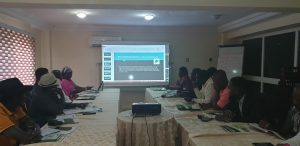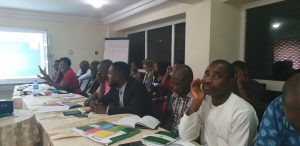SPACES FOR CHANGE convened a Special Consultative meeting, with support from Fund for Global Human Rights and Open Society Foundations, ahead of Nigeria’s forthcoming Mutual Evaluation (ME) and onsite visit by the Financial Action Task Force and ECOWAS’ Intergovernmental Action Group Against Money Laundering in West Africa (GIABA). Forty three representatives of various civil society groups (CSOs) and non-profit organizations (NPOs) across Nigeria converged at the Special Consultative Meeting held on September 13, 2019, in Abuja, to prepare and harmonize strategies for engaging FATF/GIABA assessors during the second round of Nigeria’s Mutual Evaluation scheduled for September to October 2019.
The September 13 meeting aimed to improve CSO understanding of the ME procedures, the process for assessing risks in NPOs within the FATF context, and also build their capacity to engage the FATF/GIABA assessors, especially during the second round of Mutual Evaluation scheduled for September to October 2019. The ME is a peer review process conducted by a team of experts from the FATF body who evaluate how effectively a country is preventing, detecting and responding to threats and risks of money laundering and terrorism financing in its economy. It is to this end that Nigeria conducted a National Risk Assessment in 2016 that evaluated all sectors of the economy, including the NPO sector to ascertain the level of money laundering and terrorism financing threats, risks and vulnerabilities.
The Intergovernmental Action Group Against Money Laundering in West Africa (GIABA) is an institution of the Economic Community of West African States (ECOWAS) responsible for facilitating the adoption and implementation of Anti-Money Laundering (AML) and Counter-Financing of Terrorism (CFT) in West Africa. It is also a FATF-Styled Regional Body (FSRB) working with its member States to ensure compliance with international AML/CFT standards.
The meeting started with a group discussion around that regulatory pressures arising from the application of anti-money laundering (AML) and countering financing of terrorism (CFT) legal regimes to the non-profit sector. Multiple presentations and papers delivered at the meeting explained the FATF Recommendations, especially Recommendation 8 and the ME’s technical and effectiveness compliance procedures. S4C further provided deep insights into the results of the Nigeria’s National Risk Assessment (NRA) conducted by the country’s National Financial Intelligence Unit (NFIU), published in 2016. An in-depth discussion around the NRA results and the implications for the civil society space ensued after the presentations.
S4C’s 2016 study which examined the link between the Financial Action Task Force’s (FATF’s) Recommendation 8 (R8) and restrictions on civic freedoms in Nigeria established that international regulations such as the FATF Recommendations have significant influence over government behaviour, causing governments to impose certain restrictions or measures that often tighten the environment for free civil society and democratic engagement. Although FATF does not specifically direct governments to impose these restrictions, domestic efforts to either secure favorable ranking during the ME or enhance local compliance with the international requirements often lead them to impose stiff regulatory measures that narrow the space for legitimate non-profit operations in the country.
Together, participants identified 6 key areas of regulatory concern in the NRA that have the potential to shrink the civic space. Some of the concerns include the classification of NPOs as designated non-financial institutions (DNFIs), the need to clearly identify the subset of NPOs at risk of terrorism-financing, the rating and scores for the money laundering and terrorism financing assessments in the NPO sector, among others. If unaddressed, the blanket and disproportionate implementation of regulatory measures in ways that disrupt legitimate charitable activities in the country will persist. Other major concerns that dominated the discussions include:
- No NPO Representation in the National Risk Assessment Team: The non-profit sector was not represented in the multi-disciplinary team that conducted the national risk assessment. The team was made up of nine multidisciplinary working groups, with experienced professionals drawn from various ministries, departments, and agencies, including the private sector.
- Inadequate Consultation of NPOs During the National Risk Assessment: The Nigerian NRA team only engaged only one NGO during its assessment -The Nigeria Network of NGOs—whom it had considered as the umbrella body of all non-profit organisations operating in Nigeria. In actual fact, NNNGO does not represent all the diverse networks of non-profit organisations in the country. Hence the information collated and the data analysed during the NRA exercise may not wholesomely reflect the true situation of activities in the non-profit sector.
- The Classification of NPOs as Designated Non-Financial Businesses and Professions (DFNBPs): Although the FATF in its Best Practice Paper (BPP), states clearly that NPOs are not to be considered DNFBPs, Nigeria’s Money Laundering (Prohibition) Act of 2004 classified non-profit organizations as DFNBPs which also comprises of dealers in jewelry, cars and luxury goods, chartered accountants, audit firms, tax consultants, mortgage brokers, consulting companies, clearing and settling companies, legal practitioners, hoteliers, casinos, super markets or such other businesses as the Federal Ministry of Commerce or appropriate regulatory authorities may from time to time designate. The classification of non-profit organizations as DNFBPs, lumping non-profit entities together with profit making businesses reflected in the poor ratings of the sector.
- Inadequate Evidence of TF in the NPO Sector: The national risk assessment scored the NPO sector under the grouping of DNFBPs as highly vulnerable to terrorism-financing based on the Nigerian Financial Intelligence Unit’s Typology report of 2013, which disclosed methods of terrorism financing to include bank robberies, livestock rustling, smuggling and sale of arms, use of non-profit organisations and charity organisations. While the report suggests that the risk of using NPOs as a conduit for either raising or moving funds for terrorist activity is high, the evidence provided was insufficient to draw statistically significant generalization of TF risks in the entire NPO sector.
- Action Group on Free Civic Space: The participating organizations agreed to forge a common front for the purpose of engaging the FATF/GIABA assessors and advancing the shared concerns affecting the civil society. The resolution to collaborate and galvanize joint action birthed the idea of the Action Group on Free Civic Space. The name was adopted after considering a range of name options for the group. The name represents a loose network of different organizations working on different issues, but committed to ensuring that government regulation in the name of national security do not shrink the civic space in the country. The name further describes the team of civil society actors that will be engaging FATF/GIABA assessors.





